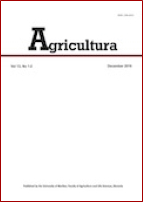Tannins and their Effect on Production Efficiency of Ruminants
DOI:
https://doi.org/10.18690/agricultura.15.1-2.1-11.2018Keywords:
hydrolysable tannins, condensed tannins, ruminant productionAbstract
In the recent years, numerous publications have analysed the efficiency of phytogenic feed additives, plant-based supplements, in animal nutrition for improving livestock productivity and the quality of products. Regarding ruminant nutrition, the publications very often focus on the fate of proteins and on productivity as a result of the use of tannins rich plant extracts and plant parts. Most tannin-related studies are concerned with forages, mostly legumes, less is know about tannins extracts. Tannins are phenolic secondary compounds naturally occurring in plants and helping to protect them against herbivores, defend them against pathogens and are participating in energy and nitrogen conservation. Tannins were for a long time considered to be antinutritive compounds to ruminants. Several new systematic studies, associated with analyses of tannins have revealed beneficial roles in animal nutrition and health. New studies more precisely distinguish different groups of tannin. As a result, feed containing tannins, hydrolysable or condensed, has the effect of slowing down the protein digestion, increasing microbial protein synthesis in rumen and reducing methanogenesis. Positive effects on
animal health such as the prevention of bloating and multiplication of parasites have also been reported. When fed in proper amounts, tannins may promote higher level of productivity such as higher growth rate, higher milk yield and improved milk quality. Due to their positive role, they are being gradually considered as important nutritive additives in many ruminant feeds.
Downloads
Downloads
Published
Issue
Section
License
Copyright (c) 2020 The Authors

This work is licensed under a Creative Commons Attribution-NonCommercial-NoDerivatives 4.0 International License.
